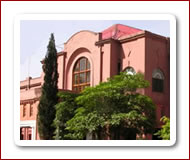National Workshop on Air Pollution and Smog From Science to Solution
The Department of Environmental Sciences, University of Veterinary and Animal Sciences (UVAS), Lahore arranged a national workshop on “Air Pollution and Smog: From Science to Solution” on Wednesday November 8, 2017. Punjab Minister for Environment Protection Mrs. Zakia Shahnawaz Khan presided over the inaugural session of the workshop while the worthy Vice-Chancellor Meritorious Prof. Dr. Talat Naseer Pasha S.I., Chief Meteorologist Flood Forecasting Division Lahore Muhammad Riaz, Dean Faculty of Biosciences Prof. Dr. Habib-ur-Rehman, Chairman Department of Environmental Sciences Dr. Saif-ur-Rehman Kashif and a number of students, researchers, environmental experts and faculty members attended the workshop.
Following speakers presented in the workshop:
- Mr. Muhammad Riaz, Chief Meteorologist, Meteorology Department, Govt. of Pakistan, Lahore.
- Mr. Zia ul Islam, Country Manager Ozone Cell, Ministry of Climate Change, Islamabad.
- Prof. Dr. M. Faheem Khokhar, Head of Department, Institute of Environmental Sciences and Engineering, National University of Science & Technology, Islamabad.
- Mr. Nasim ur Rehman, Director, Environment Protection Department, Govt. of Punjab, Lahore.
- Mr. Ahmad Rafay Alam, Env. Lawyer, Lahore
- Mr. Aleem Butt, Chief Environmentalist, Solution Environmental & Analytical Laboratory (SEAL), Lahore
- Dr. Saamia Saif, Environmental Consultancies and Options (ECO) Cavalry Ground, Lahore.
- Miss Nadia Ayub, representative of World bank / and Lahore Chamber of Commerce and Industry, Lahore.
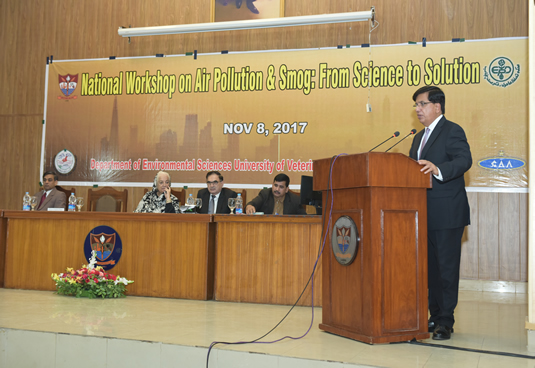
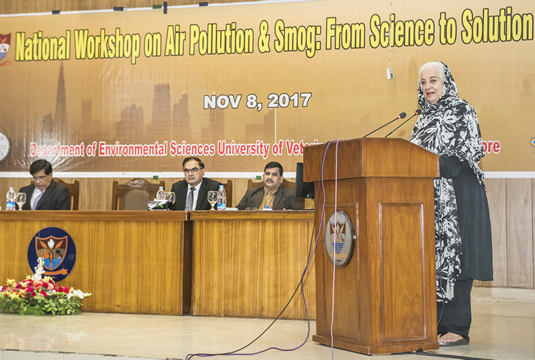
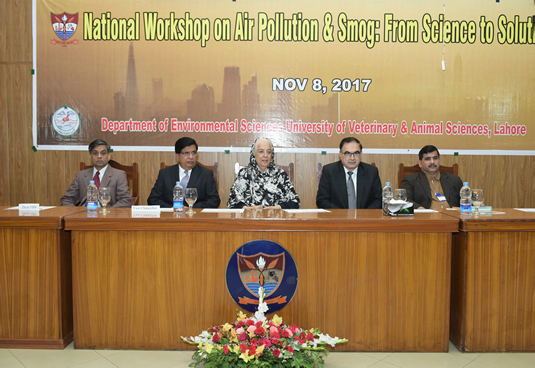
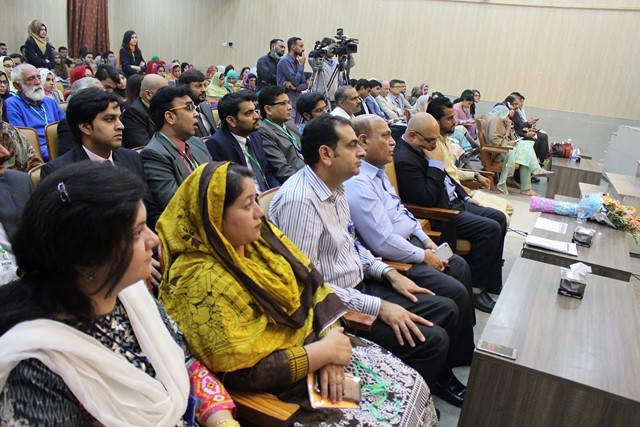
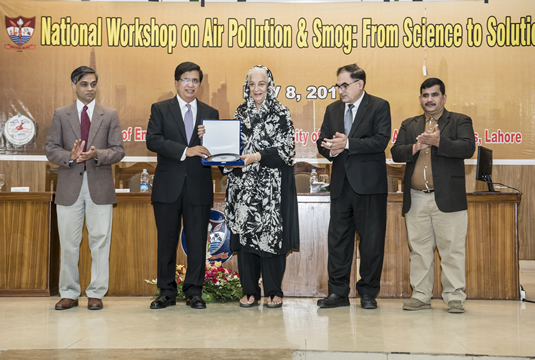
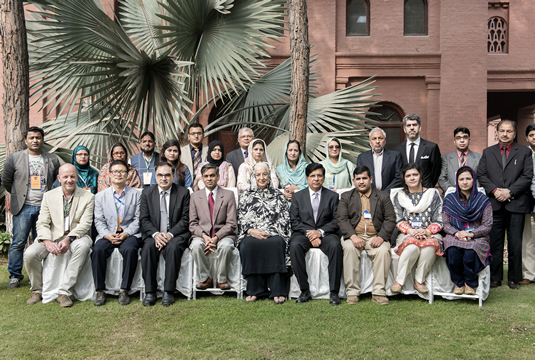
Workshop Recommendations
“National Workshop on Air Pollution & Smog: From Science to Solution” was organized at University of Veterinary & Animal Sciences, Lahore on 8 Nov, 2017.
The recommendations of this workshop are as follows:
Recommendations of this workshop:
Short Term Recommendations:
- A very high amount of pollutants are being emitted by vehicles, due to low maintenance, high traffic and slow movement on rushy areas, and lack of monitoring of exhaust gases of different vehicles by concerned departments. It is suggested that catalytic convertors to be installed in all local vehicles and should be inspected on regular basis by concerned departments..
- The two stroke vehicles generate very high levels of pollution on roads and there should be a plan for the substitution of two stroke vehicles by 4 stroke vehicles. Although law is present but mostly 2 stroke vehicles are present on roads especially in peri-urban Lahore.
- There should be regulations for Motor Cycle Rickshaws to limit total number of passengers to 5 persons including driver as overloaded vehicles contribute to more air pollution. There should be policy by Govt. to substitute Motor Cycle Rixshas to avid smog formation in coming years.
- Fuels like petrol and diesel need to be monitored for their constituents especially lead (Pb) and sulfur (S) contents by concerned authorities.
- Titanium oxide coated tiles need to be placed on roofs and foot paths to adsorb pollutants from air.
- Recycling sector especially pyrolysis industry uses tyre scraps for the production of oil to be mixed with diesel. This pyrolysis produced oil has high sulfur contents, when mixed with diesel emits high levels of sulphur dioxide into air after combustion. Therefore, import of tyre scraps for pyrolysis needs to be regulated.
- Commercial air filters working on solar energy need to be installed on main roads to clean pollutants and dust from air.
- Air Quality Monitoring System should be initiated and Air Quality Index (AQI) should be telecasted regularly on FM channels as well as be displayed on main roads for prevailing AQI of the area through digital boards.
- The burning of trash having plastics in smelters should be regulated and minimized.
- Industries should install scrubbers to prevent air pollution. Factory license should be cancelled after a grace period in case of non-compliance by concerned authorities.
- There should be water sprinkling on roads especially before winter to reduce respirable dust particles (PM 2.5). Contractors engaged on Metro Train Project need to be motivated for water sprinkling daily on project site to reduce dust particles.
- Pollution eating plants like Areca Palm, Mother-in-Law's Tongue, The Money Plant, Petunia plants and others also need to be planted in homes, offices and road sides which may clean air naturally.
- As there is much contribution of smog due to trans-boundary fires, issue need to be addressed with transboundry government to stop/minimize fires to trash before onset of winters.
- Smog policy which has been prepared by Punjab Govt. without consulting all stake holders like Academia/NGOs/Industrial partners, need to be discussed with all stake holders before implementation to get maximum output for controlling smog/air pollution in Lahore.
Long Term Recommendations
- It should be mandatory for industries to convert on renewable energy for 10 % of their electricity use every year.
- Fossil fuel vehicles need to be converted into electric vehicles. Govt. should promote electric vehicles by providing reduction on import duties on such vehicles. Moreover, small hybrid vehicles should be promoted and larger vehicles may be discouraged by imposing heavy import duties.
- There should be promotion of vertical expansion rather than lateral expansion of buildings, to avoid deforestation and new housing schemes in peri urban areas. There should be land use policy by Govt. agencies especially in Metropolitan areas.
- Forestation should be increased and there should be a check on deforestation.
- Plantation of all main roads including Canal Road and Band Road should be promoted. If plant removal is mandatory, then existing plant should be shifted to suitable place using latest technology without cutting it down.
- There should be carbon penalty on all vehicles and industries and collected fund will only be utilized for improving air quality in the city.
- Environment Protection Department should collaborate with Higher Education Institutes like universities for their R&D and provide small grants for their pollution study projects through postgraduate students related to Environmental departments.
Department of Environmental Sciences, University of Veterinary and Animal Sciences (UVAS) is fully equipped with equipment’s needed for monitoring of different pollutants from vehicles, industries, generators (LANDCOM-III) and for monitoring ambient air quality of different parts of Lahore (HIM-6000 Haz Scanner). This university is ready to share its data, equipment’s and expertise with concerned departments if needed. UVAS is also ready to provide training to staff of concerned departments for measurement of different pollutants in air to avoid smog in coming years. |








